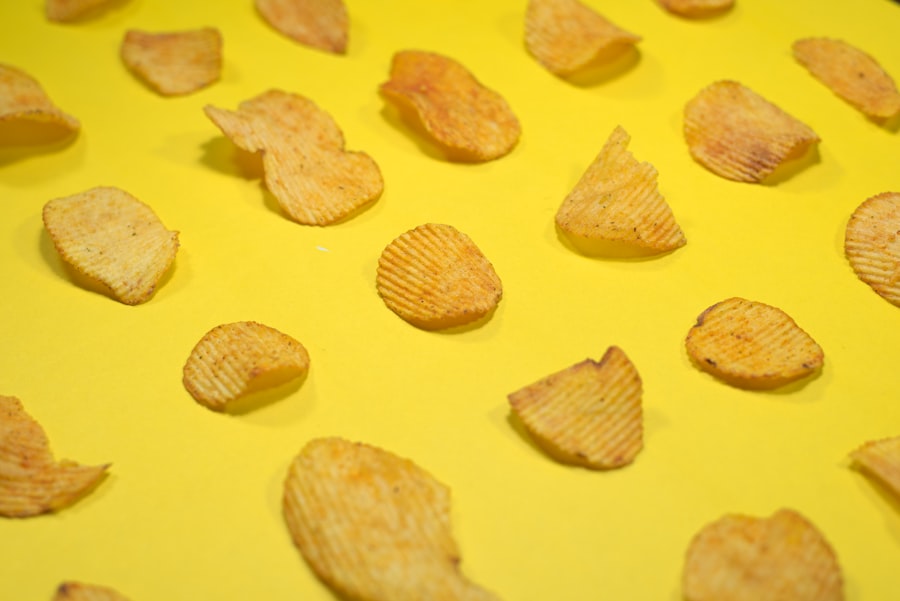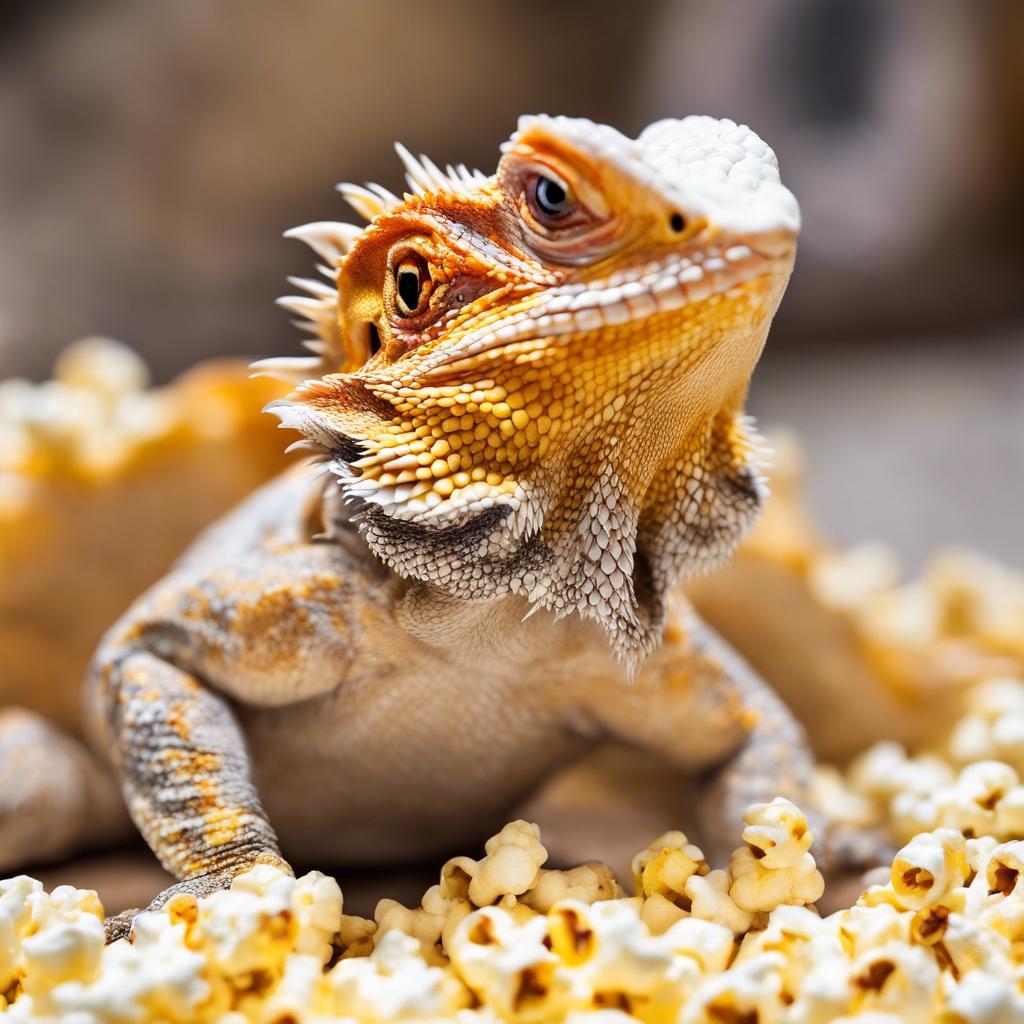Bearded dragons are popular reptile pets known for their unique appearance and docile nature. Native to Australia, these lizards have become increasingly popular as pets due to their low maintenance requirements and friendly demeanor. However, like all pets, bearded dragons require a balanced diet to thrive and maintain good health.
A balanced diet is crucial for the overall well-being of bearded dragons. It provides them with the necessary nutrients, vitamins, and minerals they need to grow, develop, and maintain their health. A proper diet also helps prevent common health issues that can arise from nutritional deficiencies. While commercial bearded dragon food is available, it is important to supplement their diet with fresh fruits, vegetables, and occasional treats.
Key Takeaways
- Bearded dragons are omnivorous and require a balanced diet of insects, vegetables, and fruits.
- Popcorn is not a suitable food for bearded dragons as it lacks essential nutrients and can cause digestive issues.
- Popcorn has low nutritional value for bearded dragons and should not be a regular part of their diet.
- Feeding popcorn to bearded dragons can lead to choking, intestinal blockages, and other health problems.
- Alternative treats for bearded dragons include fruits, vegetables, and insects that are high in nutrients and safe for consumption.
Can Bearded Dragons Eat Popcorn?
The question of whether or not bearded dragons can eat popcorn is a common one among reptile owners. While popcorn may seem like a harmless snack for humans, it may not be the best choice for bearded dragons. Popcorn is high in carbohydrates and low in nutritional value, making it an inadequate food source for these reptiles.
Popcorn lacks the essential nutrients that bearded dragons need to thrive. It does not provide the necessary vitamins and minerals that are crucial for their growth and development. Additionally, the high carbohydrate content in popcorn can lead to weight gain and obesity in bearded dragons if consumed regularly.
Nutritional Value of Popcorn for Bearded Dragons
To understand why popcorn may not be suitable for bearded dragons, it is important to examine its nutritional content. Popcorn is primarily made up of carbohydrates, with very little protein or fat. While carbohydrates are an important energy source for humans, bearded dragons require a more balanced diet that includes protein and fat.
Compared to other foods that are better suited for bearded dragons, popcorn falls short in terms of nutritional value. For example, leafy greens such as kale and collard greens are rich in vitamins A and C, calcium, and fiber, all of which are essential for the health of bearded dragons. Insects such as crickets and mealworms are also important sources of protein for these reptiles.
Risks and Concerns of Feeding Popcorn to Bearded Dragons
Feeding popcorn to bearded dragons can pose several risks and concerns. Firstly, the high carbohydrate content in popcorn can lead to weight gain and obesity in these reptiles. Obesity can have serious health consequences for bearded dragons, including joint problems, heart disease, and a shortened lifespan.
Furthermore, popcorn can be difficult for bearded dragons to digest. Their digestive systems are not designed to process large amounts of carbohydrates, which can lead to digestive issues such as bloating, gas, and diarrhea. These digestive issues can cause discomfort and potentially lead to more serious health problems if not addressed.
Alternative Treats for Bearded Dragons
While popcorn may not be a suitable treat for bearded dragons, there are plenty of other options that are safe and healthy for them. Fruits such as berries, melons, and apples can be given as occasional treats. Vegetables like carrots, bell peppers, and squash are also good options.
In addition to fruits and vegetables, bearded dragons can also enjoy occasional treats of insects such as crickets or mealworms. These insects provide a good source of protein for these reptiles. However, it is important to ensure that the insects are gut-loaded with nutritious foods before feeding them to the bearded dragon.
Bearded Dragon Care: Housing and Environment

Creating a comfortable and safe environment is essential for the well-being of bearded dragons. They require a spacious enclosure with proper heating and lighting to mimic their natural habitat. The enclosure should have a temperature gradient so that the bearded dragon can regulate its body temperature by moving between warmer and cooler areas.
A UVB light is crucial for bearded dragons as it helps them synthesize vitamin D3, which is necessary for the absorption of calcium. Without adequate UVB lighting, bearded dragons can develop metabolic bone disease, which can lead to weak bones and other health issues.
Bearded Dragon Care: Feeding and Nutrition
Feeding bearded dragons a balanced diet is crucial for their overall health and well-being. They require a combination of fresh fruits, vegetables, and insects to meet their nutritional needs. Leafy greens such as collard greens, kale, and dandelion greens should make up the majority of their diet.
In addition to leafy greens, bearded dragons should also be offered a variety of vegetables such as carrots, bell peppers, and squash. These vegetables provide additional vitamins and minerals that are essential for their health.
It is important to note that bearded dragons should not be fed insects exclusively. While insects are an important source of protein for these reptiles, they should be supplemented with a variety of fruits and vegetables to ensure a balanced diet.
Bearded Dragon Care: Hydration and Water Needs
Bearded dragons obtain most of their hydration from the food they eat. However, it is still important to provide them with a shallow dish of water in their enclosure. The water should be changed regularly to ensure cleanliness.
In addition to a water dish, bearded dragons can also benefit from regular misting. Misting their enclosure with water can help increase humidity levels and provide them with an opportunity to drink droplets of water from the plants or surfaces in their enclosure.
Common Health Issues in Bearded Dragons
Bearded dragons are generally hardy reptiles, but they can still experience health issues if not properly cared for. Some common health issues in bearded dragons include metabolic bone disease, respiratory infections, parasites, and impaction.
Metabolic bone disease is a condition that occurs when bearded dragons do not receive adequate calcium and vitamin D3. This can lead to weak bones, deformities, and other health problems. Respiratory infections can occur if the bearded dragon's enclosure is too cold or if it is exposed to drafts.
Parasites such as mites and worms can also affect bearded dragons. These parasites can cause weight loss, lethargy, and other symptoms. Impaction occurs when a bearded dragon ingests a foreign object that becomes lodged in its digestive system. This can lead to blockages and other serious health issues.
Preventing Health Issues in Bearded Dragons through Proper Care and Nutrition
Proper care and nutrition are key to preventing health issues in bearded dragons. Providing them with a balanced diet that includes a variety of fruits, vegetables, and insects is crucial for their overall health and well-being. It is also important to ensure that their enclosure is set up correctly with proper heating, lighting, and humidity levels.
Regular check-ups with a veterinarian who specializes in reptiles are also important for the prevention of health issues. A veterinarian can provide guidance on proper care and nutrition, as well as perform routine examinations to catch any potential health problems early on.
In conclusion, a balanced diet and proper care are essential for the health and well-being of bearded dragons. While popcorn may not be suitable for their diet due to its low nutritional value and potential digestive issues, there are plenty of other treats that are safe and healthy for them. Providing a variety of fruits, vegetables, and insects will ensure that they receive the necessary nutrients they need to thrive.
Creating a comfortable and safe environment is also crucial for the overall well-being of bearded dragons. Proper heating, lighting, and humidity levels should be maintained in their enclosure to mimic their natural habitat. Regular check-ups with a veterinarian who specializes in reptiles are important for the prevention of health issues and to ensure that they are receiving proper care and nutrition.
By providing a balanced diet, proper care, and regular veterinary check-ups, bearded dragon owners can ensure that their pets live long, healthy lives. It is important to continue learning about the specific needs of bearded dragons to provide them with the best possible care.
If you're curious about what foods are safe for your bearded dragon to eat, you might be interested in an article on Reptile Wizard titled “Can Bearded Dragons Eat Popcorn?” This informative piece explores whether popcorn is a suitable snack for these reptiles and provides valuable insights into their dietary needs. To learn more, check out the article here. And while you're at it, don't forget to read their disclaimer here and get in touch with them through their contact page here.
FAQs
What is a bearded dragon?
A bearded dragon is a type of lizard that is commonly kept as a pet. They are native to Australia and are known for their distinctive spiny “beard” under their chin.
Can bearded dragons eat popcorn?
While popcorn is not toxic to bearded dragons, it is not recommended as a regular part of their diet. Popcorn is high in carbohydrates and low in nutritional value, which can lead to obesity and other health problems in bearded dragons.
What should bearded dragons eat?
Bearded dragons should primarily eat a diet of insects, such as crickets and mealworms, as well as leafy greens and vegetables. It is important to provide a balanced diet that meets their nutritional needs.
Can bearded dragons eat other types of human food?
Some types of human food, such as fruits and vegetables, can be given to bearded dragons in moderation. However, it is important to avoid foods that are high in fat, salt, or sugar, as well as any toxic foods.
What are the risks of feeding bearded dragons the wrong foods?
Feeding bearded dragons the wrong foods can lead to health problems such as obesity, malnutrition, and digestive issues. It is important to research and provide a balanced diet that meets their nutritional needs.

